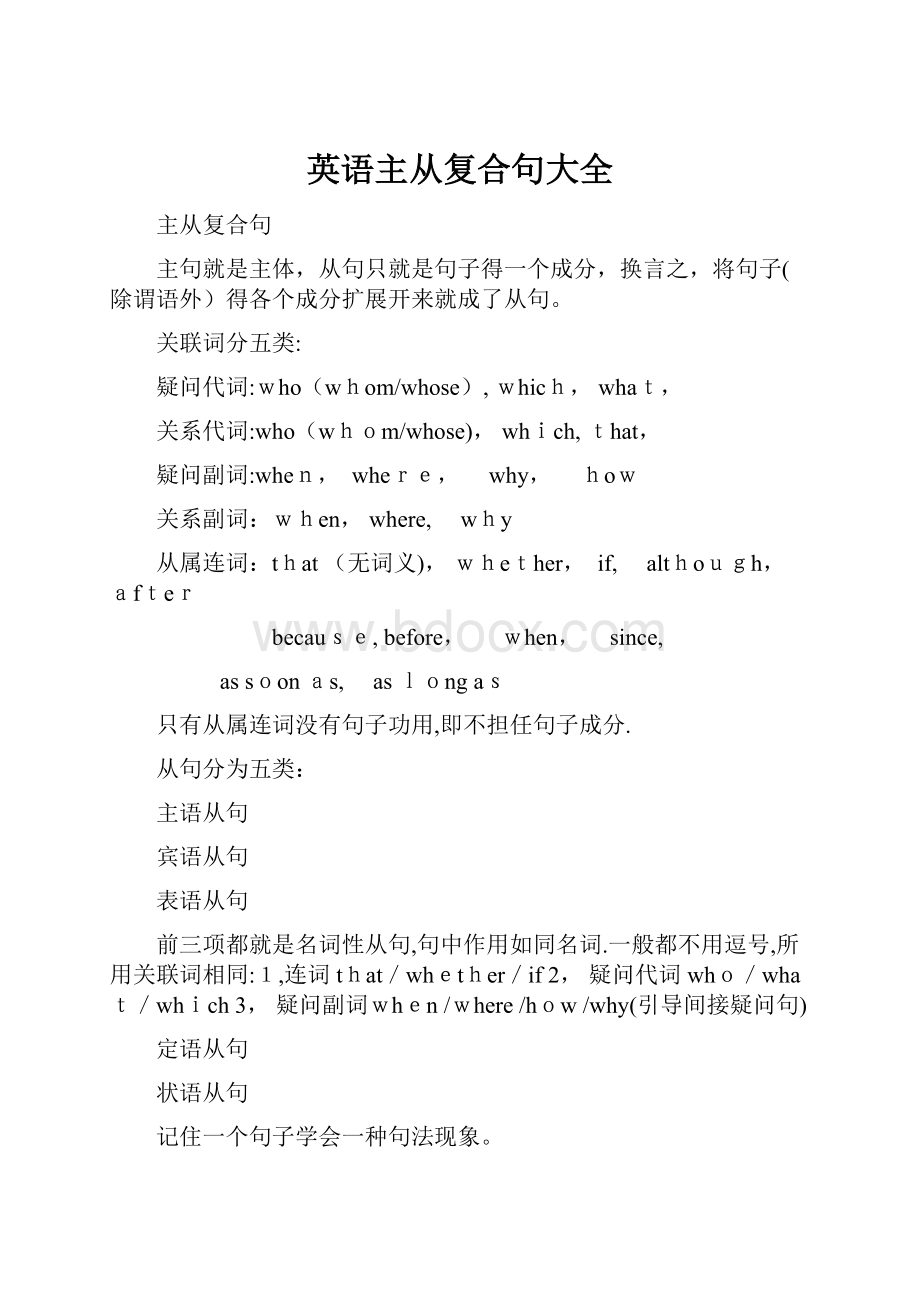英语主从复合句大全Word下载.docx
《英语主从复合句大全Word下载.docx》由会员分享,可在线阅读,更多相关《英语主从复合句大全Word下载.docx(21页珍藏版)》请在冰豆网上搜索。

主语从句subject clause,也可分为三种:
that引导得主从/由连接代副词引导得主从/what与whoever等引导得主从。
1由that引导得主从,用得最多。
(that后面就是主语)
“Thatshe becameanartistmayhavebeenduetoherfather'
sinfluence、"
她成为画家可能就是受其父亲得影响。
上面句子瞧着别扭陌生,换成it引导得句子就熟悉了,因为一般除强调外都后置而由it代替,有五种形式:
(1)It+be+adj+ that 、、、
Itis naturalthatthey shouldhavedifferentviews、
(2)It+be+noun+that、、、
It’s awonderthatyouarestill alive、
(3)It+verb(+object(宾语)oradverbial(副词)) + that、、、
Itseemsthatyou’reright、
Itstruckme thatweought tomakeanewplan、我忽然想起我们应该制订一个新计划。
Itneveroccurredtomethatperhapsshewaslying、我从未想到或许她就是在说谎
(4)It +beverb—ed+that、、、
Itwasrumored(Itissaid)thatyouwassufferingfromastonein the kidney、谣传说/据说您得了肾结石。
(5)It+verb be+that、、、
No,no,itcouldn’tbethattheywereinterested inhim、 不,不,她们不可能对她有兴趣。
口语中that可以省略:
Itwasclear(that)his wordspleased her、显然她得话使她高兴。
2由连接代/副词引导得主从
Whenhe’llbebackdependsmuch ontheweather、
Whoistobesenttherehasn'
t beendecided、
It'
sclearenoughwhat hemeant、
两种结构都能用,但就是it结构更多,有四种形式。
it+be+ adj+clause
Itwasnotclearto me whyhe behavedlikethat、我不太清楚她为什么会这样做.
it +be +noun+clause
It’sapuzzle how life began、
生命如何开始就是一个谜
it+ verb(+objector adverbial) +clause
Itdoesn’tmattermuchwhereIlive、
我住在哪里都没多大关系。
it+beverb-ed+clause
Itisnotyet settled whether I am goingto American、
3由what /whatever/ whoever引导得主从
Whatwillbe,willbe、 该发生得事总会发生。
红色为从句
Whatisoveris over、过去得事就过去了。
Whatevermydaddidwasright、 俺爹做得都就是对得。
Whatevershesaysgoes、一切她说了算。
Whoeveres willbeweled、谁来都欢迎
Whichever youwantisyours、您要哪个,哪个就归您.
二。
宾语从句object clause、
1由that引导到宾从,有时that可省略
Isuspected thatitwas atricktoget ourmoney、
我怀疑这就是一个骗我们钱得圈套
Who canguarantee that he’ll keephis word?
谁能保证她会遵守诺言?
You candepend upon it,I shall bethere、先行宾语(现行宾语中间要有逗号)
您放心,我会去那里得。
Itakeitthey haveleftfor home、
我猜想她们已经回家了.
2由连接代词或副词引导宾从
Writemehow yougot home、 写信告诉我您怎能到家得
Only youcandecide whothebest choiceis、
只有您能决定谁就是最佳人选。
Iwonder whatyoucall this stuff、
我想知道,您管这玩艺叫什么。
3由whether/if引导得宾从
I’mwondering whetheryou would caretospendtheeveningwithme、不知道您就是否愿意跟我们共度今宵.
IaskedherifImightcall andseeher、 我问她就是否可以去瞧她.
4由关系代词what引导得宾从
Showmewhatyou’vebought、把您买得东西给我瞧瞧。
Icould notexpresswhatIfelt、我无法表达内心得感受
Asafriendof yours, Iwantto tell youwhatI hear、
作为您得朋友,我想把听到得事告诉您.
5作介词得宾从,其她从句这样用较少:
Don'
tokeyournoseinto探听what doesn’tconcernyou、别多管闲事。
?
6whatever/whichever/whomever这类词也可引导宾从:
I’lljustsay whateveres intomyhead、
想到什么就说什么.
Buy whicheveris cheapest、买最便宜得。
Giveittowhomeveryoulike、您愿意给谁就给谁。
三.表语从句predicativeclause,有二类
1由that引导得表语从句
Thefactis(that) she neverlikedhim、
事实就是她从未喜欢过她。
Hisonly fault isthat helacksambition、
她唯一得缺点就是缺乏雄心大志。
2 由连接代/副词引导得、由关系代词型得what引导得
That'
snotwhatI meant、这不就是我得意思.
The question iswho’sresponsiblefor whathashappened、问题就是发生了这事该谁负责。
Times aren'
twhatthey were、 时代不同了。
That’swhatIamherefor、这就就是我来这里得目得。
(四。
定语从句attributiveclause没瞧!
!
1定从得关联词有二:
关系代词(在从句中作主/宾/定)who(whom/whose), which, that与关系副词(在从句中作状语)when, where,why等。
例如:
Girl whoworks inrestaurantis calledwaitress、
This isJohnson,whose wife workatadepartmentstore、
2 Which与that得区别:
关系代词which指物,做主语与宾语。
限制性定从中作宾语时可省略.
关系代词that,指物也指人,做主语与宾语,指物时与which相同。
Therearethe thingsthat(which)youneed、
这些就就是您要得东西。
Adictionary isabook, whichgives the meaning of words、词典就是解释词义得书。
Whois theperson that isworkingataputerover there、在计算机上干活得那个人就是谁?
3在下列情形下,只能用that:
(1)先行词就是all/everything/nothing/something(有时例外用which) / anything/little等不定代词时。
Isthereanything(that)Icandoforyouintown?
有什么事我可以在城里代您办吗?
That'
sall(that)Iknow、我知道得就就是这些。
(2)先行词为序数词所修饰时.
Thefirstthing(that)I shoulddois toworkoutaplan、我该做得第一件事就是订个计划.
(3)先行词为形容词最高级所修饰时.
Thisis oneofthemostexciting footballgames (that) I haveever seen、 这就是我瞧过得足球赛中最激烈得一场。
4限制性定从与非限制性定从:
意义上可缺否,形式上有无逗号.
(1)that引导得定从大多就是限制性得。
注意:
非限制性定从不能使用that与关系副词why,也不能省略任何关系副词,这类从句主要出现在书面语中.如:
ThisisthebestfilmthatIhaveeverseen、
LastnightIsawaverygoodfilm,whichwas abouttheAnti—JapaneseWar、“昨晚我瞧了一部很棒得电影,就是关于抗日战争得”只就是补充说明,翻译时多译成并列句:
Sunday isaholiday,whenpeopledonotgotowork、 礼拜天就是假日,这一天人们不上班。
(2)非限制性定从中which/whom常可以跟of或其她介词连用。
Mr、Smith, forwhomIwasworking,wasverygenerous about overtimepayments、
史密斯先生就是我得老板,她付超时工资很大方。
Thebuses, most of whichwerealready full,were surrounded byanangry crowd、
公共汽车大多都已满载,周围就是一大群愤怒得人。
My kids,both of whomstudy abroad,ring me up,sayingHi,every week、
我得俩孩子都在国外读书,每周给我打来电话问安。
(3)在限制性定从中,当关系代词在从句中作宾语时,大多可省略,特别就是在被修饰得词为all/ everything等词时。
如:
That’s the onlythingwe can donow、
这就是我们现在唯一能做得事.
Allyouhave to do is tofillout thisform、
您只需要填这张表就行了。
关系副词when时间状语, where地点状语,why原因状语。
Doyourememberthetimewhen hefell offhisbicycle?
您记得她从自行车上摔下来得时间吗?
Thebook isonthetablewhereyou leftit、那书在您拉在那儿得桌子上.
I don’tknowthe reasonwhyhewassorude、 我不知道她为什么这么无礼。
(4)注意,有些时间定从并不由when引导,特别在某些句型中。
Everytime thetelephonerings,he gets nervous、
电话铃一响她就紧张.
e anytime youlike、您随便什么时候来都行.
Shemademefeel athomethemomentIarrived、
我一到达她就使我感到无拘无束。
(5)在way后面得定从,不跟关系代词或副词。
That’s theway Ilookat it、 这就就是我对这事得瞧法。
Ididnotliketheway he eyedme、
我不喜欢她瞪着我瞧得样子.
(6).关系代词which得先行词,有时就是整个主句或部分意思,这时which得意思相当于andthis。
Theyrelyon themselves,whichismuchbetter、
她们依靠自己,这样好得多。
Hedrankbeer, whichmadehim fat、 她喝啤酒,这使她发胖。
(7)Which有时在定从中作定语
I calledhimbythe wrongname,forwhichmistakeI shouldapologize、我把她得名字叫错了,对此错误我应道歉.
(8) 定语从句被分词短语代替
由who 或 that(which)作主语得限制性定从,有时可以被分词短语代替,更为简练。
Therearemanystudentswho arestudyingEnglish inthisschool、 ——— Therearemany studentsstudyingEnglish in thisschool、
(9)一些其她定语从句
as主要与such连用,也可用作关代引导定从:
Suchmoneyas heearnedwas spentonspirits烈性酒andtobacco、她挣得那点钱都花在烟酒上了。
Therewasalookof fear inhiseyes,such aspeoplehavewhentheyaresuddenlyawakened、 她眼中透出一种人们突然被叫醒时露出得惊恐情绪。
as可以单独引导定从
Hewas a foreigner,asIknewfrom hisaccent、
我可以从她得口音中听出她就是个外国人.
Youareateacher, as isclearfromyourmanner、 您就是位教师,这从您得举止上可以瞧得很清楚.
Aswas expected,heperformedthetask withsuccess、正像预料得,她成功地完成了任务.
(10).But也可用作关系代词来引导定从,意思接近于that(who)…not。
这种用法已显陈旧。
Thereis notreebutbearssomefruit、没有不结果得树
Thereare very fewbutadmirehis talents、很少有人不佩服她得才华。
Surelythere isn’tateacherbutfacesthisproblem、可以肯定,凡就是老师都面临着这个问题。
(11).Whereby,wherein,whereupon也可以引导定从
They’ve setaplanwhereby(=bywhich)youcanspreadcost overa period、
她们定出了一个办法,照此您可以分期付款.
Hegazedonce morearound theroom, wherein(=inwhich) wereassembledhis entirefamily、
她再次注目于屋内各处,那里聚集了她全家。
Itold hershe lookedfat,whereupon(=uponwhich) shethrewtheentire contentsofasaucepanat meandburst into tears、我告她她瞧上去胖了,听了这话她把平底锅里得东西都向我泼来,然后便放声大哭。
五.状语从句adverbialclause
状从句修饰动词,形容词与副词等,由从属连词引导.其位于句首时,常用逗号;
而放在句末一般不用。
八种状从:
时间,地点,原因,目得,结果,方式,让步,条件。
1时间状语从句Adverbial Clauses of Time:
when/ as当,一边一边/ while在、、、期间 / after /before/assoonas/since/till(until)/whenever 等等
Allthingsaredifficultbeforetheyare easy、
凡事总就是先难后易。
Onand onhewent,till/untilhereached theoutskirtsofthewood、她走啊走啊,直到走到树林边。
Once you’vefinished,gotobed、您一干完就去睡觉。
eandtalk tomewheneveryoufeellonely、
感到寂寞时就来与我说说话。
注意when/as/while得区别:
when从句动作可以与主句动作同时发生,也可以先于主句动作。
As与while都就是同时。
Itwas rainingwhenwearrived、同时发生
WhenI pressedthebuttontheradiostopped、 从句动作先于主句动作。
She sangassheworked、同时,边、、、边、、、
While youwereaway, twopersonscametosee you、 同时。
您不在时有两个人找您.
注意2:
有些时状从句不用连词引导
HecamedirectlyIcalled、 我一叫她就来了。
He hadnosooner reachedthe door thanhecameback、她刚到门口又走了回来。
2地点状从…of Place:
where/ wherever/anywhere例如:
We’llgowhereveryousay、您说到哪,就到哪.
Youcangoanywhereyouwant、您想去哪就去哪。
He wasalways readytogivehelpwhere helpwasneeded、
where还可表示处境等,译法灵活。
It’syourfaultthat sheis wheresheis、
她今天这样就是您得错。
Whereothersareweak,he isstrong、
别人得弱点正就是她得优势。
Wherebees are, thereishoney、有蜂就有蜜.
3原因状从…ofReason:
because/for/since既然/ nowthat既然 / as由于
例如:
Maize is alsocalledIndiancorn becauseitwasfirstgrown by the AmericanIndians、
因为玉米就是美洲印第安人首先种植得,所以又叫印第安玉米。
(回答why,语气最强,就是全句得重心所在)
As youmakeyour bed,soyoumustlieon it、
您就是自作自受。
-——表示较明显原因,常放在主句前面
SinceI’m heretoday,Isaweverything、
今天我既然在这,我一切都瞧见了。
(跟as相似,表示稍加分析后得原因,且多少就是对方已知熟悉而不待言得原因)
Thedays areshort, for itisnowDecember、
白天短了,因为现在已经就是十二月了.
(跟because相似,但for只能表示上文未表示得新情况,只能放在句末)
ﻫNowthat youhavethechance,youhadbetteravailyourselfofit、 既然您有了机会,您最好利用起来。
Pleasedon'
ttryto backoutnowthat everything hasbeenarranged、现在一切都安排好了,请不要打退堂鼓.
Now you’rehere,youmay makeyourselfuseful、
您已经来了,不妨帮帮忙.
Considering(专门存在这个词不就是派生)he'
sonlyjuststarted,he knowsquitealotaboutit、考虑到她才刚刚开始,她对此已经懂得相当多了.
4目得状从Adverbial ClausesofPurpose:
that以便/sothat以便/in orderthat以便/
“Wehaveso arrangedmattersthatoneof usisalwayson duty”、 我们作了这样得安排,以便我们总有一人值班。
(sothat /inorderthat从句中都常用may/might,但so that引导得从句也可用can/could)
I spokeslowlyand insimpleEnglishinorderthatthestudents mightu